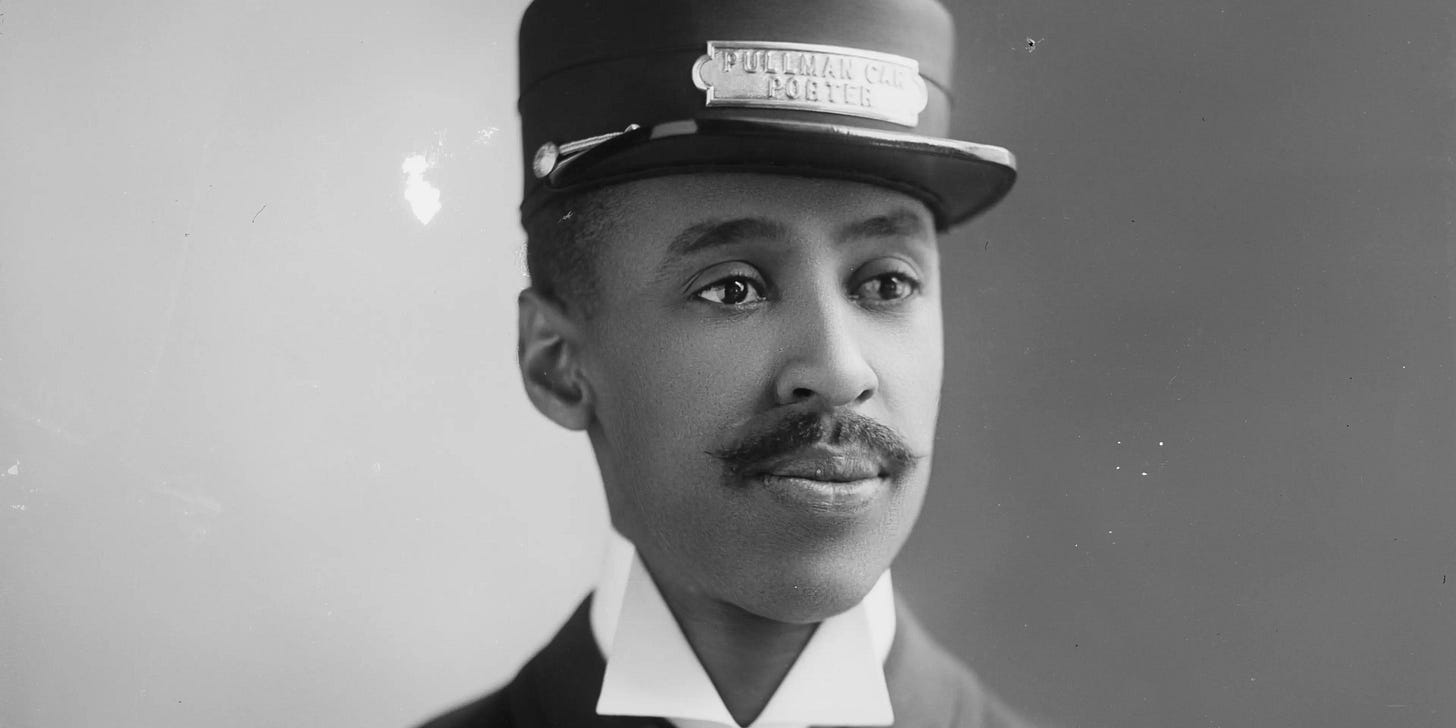The Brotherhood of Sleeping Car Porters (1925) – The First Black-Led Union That Changed America
Black History Through the Lens of Liberation
In the early 20th century, being a Pullman porter was one of the few jobs available to Black men that provided a steady income. However, it came at a steep cost—long hours, low pay, and relentless racism. These men, often called "George" after the company's founder, George Pullman, were expected to endure mistreatment, subservience, and grueling working conditions with little hope of advancement. But in 1925, A. Philip Randolph and a group of fearless organizers formed The Brotherhood of Sleeping Car Porters (BSCP), marking the birth of the first Black-led labor union in the United States.
This wasn’t just about wages—it was about dignity, self-determination, and racial justice. The BSCP didn't just fight for workers' rights; they laid the groundwork for the broader Civil Rights Movement, proving that organized labor could be a powerful tool in the fight for Black liberation.
The Struggle for Justice in the Workplace
Pullman porters were some of the most overworked and underpaid laborers of their time. Their responsibilities included carrying luggage, making up beds, shining shoes, and providing round-the-clock service to white passengers—often for 400 hours a month, with no overtime pay. The Pullman Company, one of the largest employers of Black men, took advantage of the racial power imbalance, enforcing strict, demeaning policies designed to keep workers in a position of servitude.
Despite these conditions, being a Pullman porter was still considered a step up from the harsh realities of sharecropping or domestic work in the Jim Crow South. The job provided exposure to different cities, a network of fellow workers, and, for some, the ability to send their children to school. But the cost was heavy, and the men of the BSCP knew that mere survival wasn’t enough—they deserved respect, fair pay, and a voice in their own futures.
A. Philip Randolph and the Power of Organized Labor
A. Philip Randolph, a socialist and civil rights activist, was tapped to lead the movement. With his background in labor organizing and radical politics, he was the perfect leader to challenge both corporate and racial oppression. Randolph was clear: Black workers would no longer accept subhuman treatment, and they would not be intimidated into silence.
For over a decade, the BSCP fought against the Pullman Company’s union-busting tactics, which included intimidation, firings, and infiltration. The company even sought to divide the workers by bribing some and punishing others, but the Brotherhood remained steadfast. Their slogan, "Fight or Be Slaves," made their position clear.
After 12 years of relentless organizing, strikes, and legal battles, the Brotherhood of Sleeping Car Porters won official recognition in 1937—a victory that secured higher wages, better working conditions, and a reduction in working hours. This was more than a labor victory; it was a major step in the fight for racial justice.
The Brotherhood’s Role in the Civil Rights Movement
The BSCP wasn’t just about economic justice—it became a political powerhouse. Many porters were key funders of civil rights activism, using their travel networks to spread news, distribute Black newspapers, and support grassroots organizing across the country.
The BSCP helped fund and organize the 1963 March on Washington, where Dr. Martin Luther King Jr. gave his iconic “I Have a Dream” speech.
Many members were active in the Montgomery Bus Boycott, using their resources to sustain the movement.
The union played a key role in pushing President Franklin D. Roosevelt to issue Executive Order 8802, which banned racial discrimination in wartime defense industries.
Through their work, the Brotherhood of Sleeping Car Porters proved that economic justice and racial justice are inseparable—a lesson that remains critical today.
Reflections: The Fight for Labor Rights Continues
The struggles faced by the BSCP are echoed in today’s fights for fair wages, union protections, and racial equity in the workplace. Black workers continue to experience wage discrimination, job insecurity, and systemic barriers to advancement.
Much like in the 1920s, corporations and politicians still use divide-and-conquer tactics to prevent workers from organizing. Anti-union rhetoric, threats of job loss, and political suppression continue to make labor organizing difficult, particularly for Black and marginalized communities.
Reflection Question: How can we honor the legacy of the Brotherhood of Sleeping Car Porters by supporting labor movements and workers' rights today?
Why This Matters Now
The BSCP’s victory was a turning point in American labor history, proving that when Black workers organize, they win. Their legacy reminds us that:
Economic liberation is tied to racial liberation.
Labor organizing is a powerful tool against oppression.
Long-term persistence is key to dismantling systemic barriers.
Their success paved the way for future labor unions, civil rights movements, and today’s push for economic justice.Their story is a call to action: Just as the Pullman porters refused to accept exploitation, today’s workers must continue the fight for fair wages, workplace protections, and equity for all.
A 28-Day Journey Through Black Resistance and Liberation
The story of the Brotherhood of Sleeping Car Porters is just one of many powerful lessons included in my 28-Day Journey Through Black Resistance and Liberation. This living document is continuously updated to highlight the stories of Black resilience, defiance, and leadership.
🌱 Join the journey today: Click here to purchase
Let’s honor the legacy of the BSCP by ensuring that the fight for economic justice and Black liberation continues.
In solidarity and liberation,
Desireé B. Stephens, CPS-P
Educator | Counselor | Community Builder
Founder, Make Shi(f)t Happen





I appreciate your history writing - learning so much!